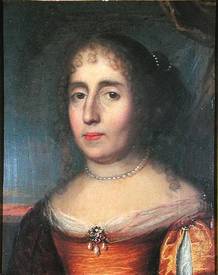About the Author

Madeleine de Scudery (1607-1701) was born at Havre on the 15th of November 1607. She was very well educated and and “introduced into the world of art and letters at an early age” (Genieys 138). Scudery was very much a “courtly lady,” and her courtly education and lifestyle had an influence on her writing; for instance, Clelia contains several instances of concerts, masquerades, and other varieties of courtly entertainment. Her writing also exhibited a strong female influence as her uncle “instilled in her an awareness of a female legacy in the arts” (Genieys 139). She established herself in Paris along with her brother, Georges, whose name she wrote under (and who Arabella assumes was the author of Clelia and Artamenes). She was “admitted to the Rambouillet coterie” but she “afterwards established a salon of her own under the title of the Société du samedi, and for the last half of the 17th century, under the pseudonym of ‘Sapho’ or her own name, was acknowledged as the first blue-stocking of France and of the world” (Chisholm).
She wrote four lengthy and rather popular novels: Artaméne, ou Le Grand Cyrus (10 vols. 1648-1653), Clélie (10 vols. 1654-1661), Ibrahim, ou Villustre Bassa (4 vols. 1641), and Almahide, ou Vesclave reine (8 vols. 1661-1663) (Chisholm). Her novels contain long conversations between characters, as well as other typical traits of romances at the time such as frequent kidnapping of the heroine (Chisholm). Madeleine de Scudery enjoyed the favor of international readers, and was well-regarded by French royalty (Genieys 17). She never married, and was considered one of the most “remarkable professional women writers in the seventeenth century” (Genieys 14). She wrote and published well into her later years, anthologizing her work and "conversations." She died in Paris in 1701.
She wrote four lengthy and rather popular novels: Artaméne, ou Le Grand Cyrus (10 vols. 1648-1653), Clélie (10 vols. 1654-1661), Ibrahim, ou Villustre Bassa (4 vols. 1641), and Almahide, ou Vesclave reine (8 vols. 1661-1663) (Chisholm). Her novels contain long conversations between characters, as well as other typical traits of romances at the time such as frequent kidnapping of the heroine (Chisholm). Madeleine de Scudery enjoyed the favor of international readers, and was well-regarded by French royalty (Genieys 17). She never married, and was considered one of the most “remarkable professional women writers in the seventeenth century” (Genieys 14). She wrote and published well into her later years, anthologizing her work and "conversations." She died in Paris in 1701.

